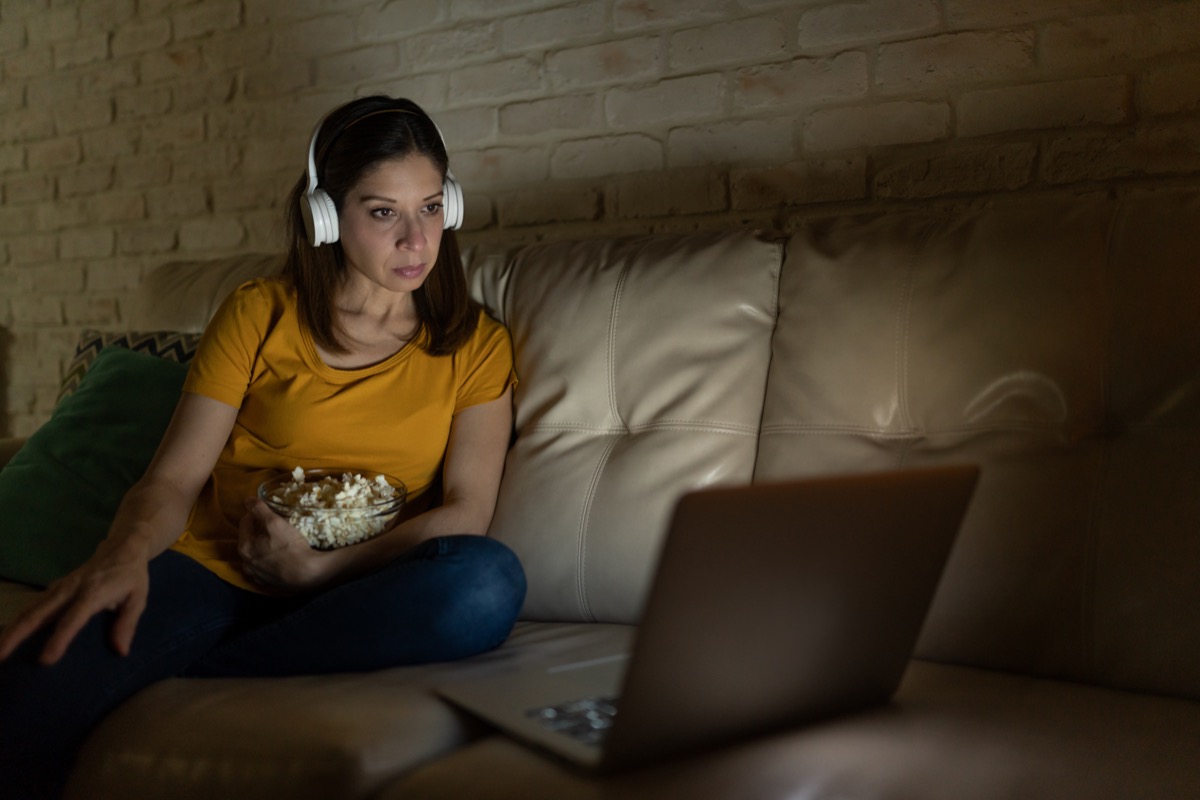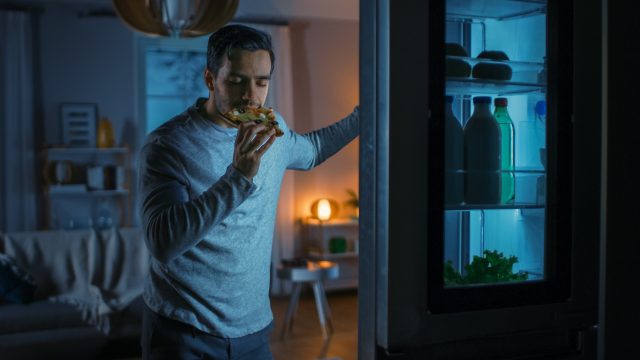Eating Late Could Lead to Obesity, New Study Suggests

When grappling with the weight loss and gain tug of war, when you eat is just as important as what you eat. Research shows that the later you consume the bulk of your daily calories, the greater the likelihood of weight gain. So it makes sense that nutritionist Adelle Davis would famously advise that we “eat breakfast like a king, lunch like a prince, and dine like a pauper.” The midnight munchies and late-night fast-food menus can pack on the fat, no matter where your standing in the kingdom may fall. However, while you may have heard this all before, new research sheds light on why it happens and how late-night eating leads to a bigger belly—and this news may alter your upcoming dinner plans.
In what may be one of the most controlled and comprehensive studies of meal timing on weight gain, Harvard Medical School researchers at Brigham and Women’s Hospital found that late eating triggers a hat trick of physiological effects that likely conspire to increase the risk of obesity. Published in Cell Metabolism in October 2022, the study found that late-in-the-day eating compared to early eating can:
- Double the odds of you becoming ravenous, making it more difficult to regulate food choice and calorie intake.
- Decrease your daily calorie burn.
- Change the expression of certain genes that control fat deposits
And don’t we all want better control of our fat deposits?
About the study
According to the Harvard Gazette, the study assessed 16 subjects—11 men and five women—who reportedly had a body mass index classified as either overweight or obese. Each subject followed a strict sleep schedule as well as identical diets in accordance with the same mealtimes. Next, they participated in two in-lab procedures; one with a meal scheduled for early in the day, and the other with the meal occurring approximately four hours later than the first. The researchers documented the participants’ hunger and appetite, took numerous blood samples, and measured subjects’ energy expenditure. Additionally, they collected biopsies of fat tissue from some participants before and after both the early and late meals to compare gene expression patterns.
“We found that eating four hours later makes a significant difference for our hunger levels, the way we burn calories after we eat, and the way we store fat,” lead researcher Nina Vujović in the Medical Chronobiology Program at Brigham and Women’s told the Harvard Gazette.
A closer look at the study’s results

While it’s no surprise the later eaters were twice as hungry as the earlier eaters, the late eaters reported craving starchy and salty foods and vegetables. Furthermore, eating late affected the levels of two hunger-regulating hormones in the body, ghrelin and leptin.
Made in your stomach, ghrelin signals the brain that you’re hungry, while leptin, a hormone created in your fat cells, tells your brain when you are full. Researchers found that late eating decreased the “I’m full” hormone leptin by 16% during the 16-hour period when subjects were awake and increased the ratio of ghrelin to leptin by 34%. Given that scenario, your brain would already be dialing your favorite pizza shop for a large pie with extra cheese.
“Taken together, our results suggest that late eating caused a decrease in energy expenditure across the [24-hour] cycle, although future studies are needed to verify this,” the researchers wrote in the study.
The biopsies added another piece to the puzzle. Late eating down-regulated several genes responsible for the breakdown of lipids—or compounds like fatty acids—and changed the expression of other genes to increase fat storage.
All of these things can potentially happen in instances where you consume more calories than you are able expend in a day, as this can increase your chances of weight gain and boosts your risk for obesity. However, the findings within this study suggest that earlier dinner reservations align better with weight loss, and that we should be washing those dinner dishes many hours before we go to sleep.









